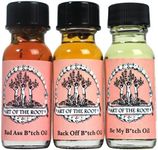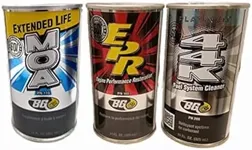Buying Guide for the Best Engine Oil Treatments
Choosing the right engine oil treatment can significantly enhance the performance and longevity of your vehicle's engine. Engine oil treatments are additives that you mix with your regular engine oil to improve its properties. They can help reduce friction, clean the engine, prevent wear, and even improve fuel efficiency. To pick the best engine oil treatment for your needs, you should understand the key specifications and how they relate to your vehicle and driving habits.ViscosityViscosity refers to the thickness of the oil and its ability to flow at different temperatures. It's important because it affects how well the oil can lubricate the engine parts. Engine oil treatments can modify the viscosity of your oil. If you drive in very cold or very hot climates, you might need an oil treatment that adjusts the viscosity to ensure optimal performance. For cold climates, look for treatments that improve low-temperature flow, while for hot climates, treatments that maintain high-temperature stability are ideal.
Detergents and DispersantsDetergents and dispersants are additives that help keep the engine clean by preventing the formation of sludge and deposits. This is crucial for maintaining engine efficiency and longevity. If you often drive in stop-and-go traffic or make short trips, your engine might benefit from a treatment with strong detergents and dispersants to combat the buildup of contaminants. For long-distance drivers, a moderate level of these additives might suffice.
Anti-Wear AgentsAnti-wear agents are chemicals that form a protective layer on engine parts to reduce wear and tear. This is particularly important for older engines or high-performance vehicles that experience more stress. If your vehicle has high mileage or you drive aggressively, look for an oil treatment with robust anti-wear properties to extend the life of your engine components.
Friction ModifiersFriction modifiers are additives that reduce the friction between moving parts in the engine, which can improve fuel efficiency and performance. This is beneficial for all types of vehicles, but especially for those looking to maximize fuel economy. If you are focused on getting the best mileage out of your vehicle, choose an oil treatment with effective friction modifiers.
Seal ConditionersSeal conditioners help maintain the flexibility and effectiveness of engine seals, preventing leaks and maintaining oil pressure. This is particularly useful for older vehicles where seals may have started to degrade. If you notice oil leaks or have an older car, an oil treatment with seal conditioners can help maintain engine integrity and prevent costly repairs.
CompatibilityCompatibility refers to how well the oil treatment works with your existing engine oil and engine type. It's important because using an incompatible treatment can cause more harm than good. Always check the product label to ensure the treatment is suitable for your engine type (e.g., gasoline, diesel) and the specific oil you are using (e.g., synthetic, conventional). If in doubt, consult your vehicle's manual or a professional mechanic.






















